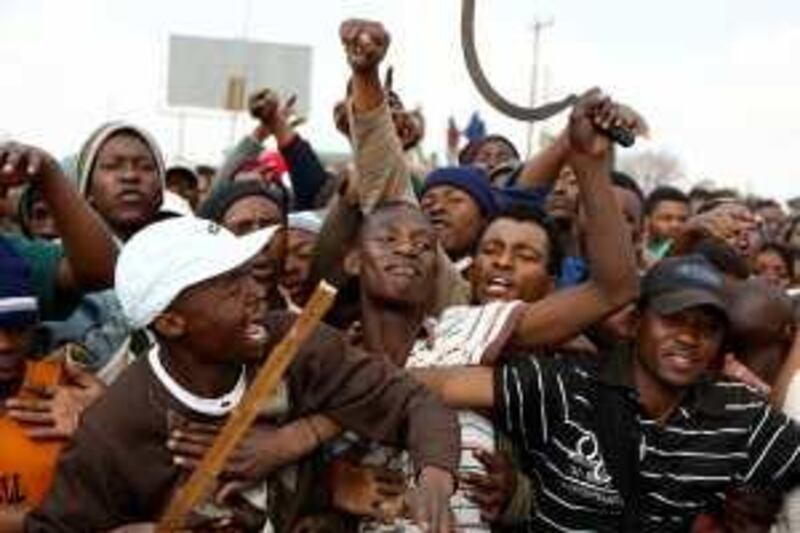JOHANNESBURG // In northern Johannesburg, the wealthy residents of Africa's richest city - both black and white - eat at expensive residents, sleep in large, well-guarded houses and shop in sprawling malls packed with designer boutiques. But an hour or so away, in the townships south and east of the city, tens of thousands of people live in dire conditions, in shacks that do not have running water or electricity - standpipes and paraffin are used instead. The contrast is stark. Many of South Africa's poor have been waiting for a decade and a half since the advent of democracy and the ascension to power of their own party, the African National Congress (ANC), for material improvement in their lives. Thabo Mbeki, president for nine years, argued that economic growth was the best way of spreading prosperity to the masses, but as inequalities increased, with the privileged beneficiaries of his Black Economic Empowerment scheme being dubbed the "black diamonds", so did resentment among the poor. Jacob Zuma capitalised on it to secure the support of the Left in his power struggle with his predecessor, which culminated in his installation as president two months ago after a general election. But his political honeymoon has proved to be distinctly short. Last week frustration boiled over into riots over what is euphemistically dubbed "service delivery" in townships around Johannesburg and across the country. The scale of the issue is enormous - the ANC government has built three million free or subsidised houses during its time in power, but inevitably still has a long way to go to make up for decades of deprivation under apartheid. In Balfour, in Mpumalanga province, police fired rubber bullets to disperse crowds, and scores of foreign Africans, many of them Ethiopians and Somalis, targeted by the mob had to flee for their lives, in echoes of last year's xenophobic violence against migrant workers. In Meyerton, south of Johannesburg, a burning barricade was set up on the R59, a main road, while Thokoza, a few kilometres away, saw several days of disturbances. Across the country hundreds of people were arrested, the disorder comes after a series of strikes, by doctors and construction workers among others, with more expected. The violence has been widely condemned, but commentators point out that the underlying grievances must be acted on. "It is imperative that the government acts swiftly to address people's demands," said The Sunday Independent in an editorial. "President Jacob Zuma ? needs to realise that any further procrastination will not only deepen mistrust and frustration, but will allow the crisis to spiral out of control." At demonstrations, protesters tend not to criticise Mr Zuma personally, but having created their expectations with his own populist rhetoric, it is unsurprising that they demand he deliver on his promises. He has had to plead for time. At a rally in his native KwaZulu-Natal this weekend, to thank the people for voting for the ANC, he said: "There are places where there is no delivery. We know that. We have made serious changes and have set up our government in such a way that we can address this problem." But he added that the new administration was still a "baby". "Give us a chance," he said. Tokyo Sexwale, the minister for housing and human settlements - who as an ANC grandee turned billionaire businessman epitomises the new South African elite - blamed previous administrations. "There is a disconnect between us and our people," he admitted to the Sunday Times. "This is quite clear. The people are not demonstrating against a three-month-old government. "They are simply saying leaders in the past have done things wrong and they want to tell us." But the ANC leadership's difficulty is that while there has been change at the top, and purges of Mr Mbeki's supporters throughout the organisation, at lower levels many officeholders remain the same, and corruption in provincial and municipal structures has been a prime cause of the failure to deliver, diverting resources from investment and spending into the pockets of officials and their relatives. Mr Zuma declared that he was determined to take action even at the cost of his popularity within the party. "People are going to start hating me because we are going to act," he said. It is yet another promise, and the danger he faces is that there is only so long that individuals can be blamed before the problem starts being seen as a systemic issue with the party as a whole. No less a moral authority than Desmond Tutu, the Nobel laureate and Archbishop Emeritus of Cape Town, condemned greed in the ANC last week, contrasting it with the spirit of the struggle against apartheid. "There is something wrong that is happening in this country," he said at a memorial service for two ANC fighters killed 20 years ago. That is not what we struggled for." It is clear that there are concerns at the highest levels of government. At the same event, Trevor Manuel, the former finance minister and now one of Mr Zuma's key advisers as a minister in the presidency, recalled a time when "we didn't dream about possessions, we didn't dream about deficits, or surpluses or taxes. "We dreamed about liberation. We were driven by passion and determination. How did we traverse from that point to where this country finds itself?" sberger@thenational.ae
Frustration turns to riots in South Africa
The people of the townships are demanding that the promises made to them by the ANC be fulfilled - and soon.

More from the national




